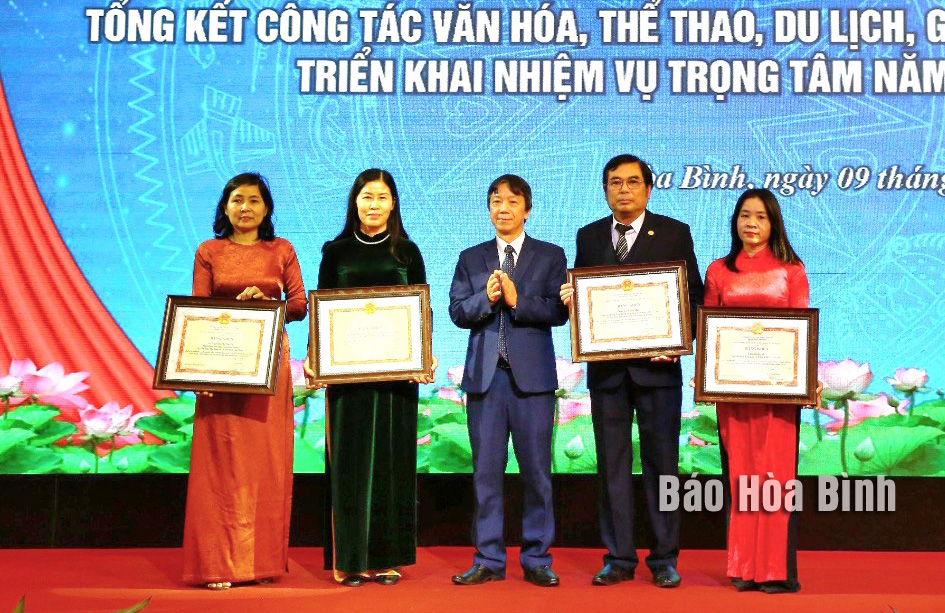
The provincial Department of Culture, Sports and Tourism on January 9 held a conference to review the culture, sports, tourism, and family work in 2023, and launch orientations and tasks in 2024.
Deputy Director of the provincial Department of Culture,
Sports and Tourism Luu Huy Linh presents certificates of merit of the Ministry
of Culture, Sports and Tourism to outstanding organisations and individuals at
the conference.
According to reports presented at the event, the province’s culture, sports and
tourism sector showed good performance in implementing its tasks in 2023.
The locality successfully organised the Khai Ha festivalof theMuong
ethnicgroup, and the folk-art festivalof ethnic minorities in Hoa
Binh. It also hosted the2023 National Traditional Musical Instrument
Soloand OrchestraCompetition, the terrain and short-distance
cycling tournament of the Vietnam Bicycle-Motor Sports Federation,
and the 37th national championship for mountain bike and road cycling in 2023.
Hoa Binh welcomed an estimated 3.8 million tourists in 2023, earning a total
revenue of 4 trillion VND (over 164 million USD), up 9.8% and 2.6% higher
than the plans set for the year, respectively.
The sector provided recommendations to the provincial People's Committee to
issue a plan to conserve and promote cultural values of the Muong ethnic group
in 2023 – 2030; and to the Steering Committee of the movementof "All
People unite to build cultural life”to issue plans and documents to
direct localities to implement the movement at the grassroots level.
Last year, the province’s culture household and residential area rates reached
88.3% and 96.3%, respectively. As many as 185 agencies and enterprises were
recognised to meet cultural standards in the 2018 - 2022 period. The percentage
of individuals regularly participating in sports and physical activities
reached 36.2%, while the ratio of households engaged in sports activities was
27%.
This year, the sector set to have 76.8% of households recognised
ascultural families, and 37.1% of the population regularly participating
in sports and physical activities.
Hoa Binh is expected to serve 4.2 million visitors and raked in 4.6 trillion
VND from tourism activities.
On the occasion, the Ministry of Culture, Sports and Tourism awarded
certificates of merit to two organisations and two individuals. Two others were
presented with insignias for the cause of culture, sports and tourism.
Meanwhile, three organisations and eight individuals were awarded certificates
of merit of the provincial People’s Committee; and 10 organisations and 11
individuals were honoured by the provincial Department of Culture, Sports and
Tourism.
The People’s Committee of Lac Son district held a ceremony on April 28 to receive the provincial relic certificate for the ancient rock carving site at Suoi Co stream, located in My Thanh commune.
A special music show titled "The country is in the fullness of joy” has been held at Hoa Binh Square in Hoa Binh city in celebration of the 50th anniversary of the liberation of the South and national reunification (April 30, 1975–2025).
The People's Committee of Lo Son commune, Tan Lac district, has organised the local annual traditional stream fishing festival on April 19 - 20.
As a land deeply intertwined with human history and Vietnam’s millennia-long journey of nation-building and defence, Hoa Binh is often revered for its epic tales and legends.
Residents of Hoa Binh boast a rich cultural identity, reflected in their unique language, traditional attire, customs, and folk melodies – described as "sweet as honey, clear as a mountain stream.”
Lac Son district’s Vu ban town held the 2025 Truong Kha temple festival on April 12–13 (the 15th–16th days of the third lunar month). Since its revival in 2019, the festival has been organised every three years, preserving valuable intangible heritage while meeting the community’s cultural and spiritual needs.



